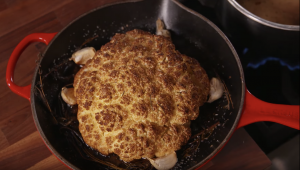I know most of us on Thanksgiving dinner enjoy the delicious turkey with perfected gravy and cranberry sauce with all the extra entrees added to it. This year I’ve decided to take a stab at trying to be more sustainable with my meals and offerings to my own family traditions. My family is aware I don’t eat meat and seem excited to try new added meals to the dinner we’ll prepare.
There are ways to be sustainable during this holiday by adding vegetarian or vegan options to the table. Sustainability with food starts with the amount of meat that is bought and consumed for these large, grandiose meals we provide to our family members.
So, I’m adding a twist to this by creating dishes that don’t involve meat, but rather delicious plants and vegetables. It will not only add more dietary value in regards to nutrition, but a offers taste to a new perspective on the holiday.
Personal Vegetarian Recipes
One of my favorite meals during Thanksgiving is a sweet potato casserole I’ve eaten all my life. It’s simply mashed sweet potatoes with hints of nutmeg, cinnamon and rosemary with marshmallows on the top broiled to perfection. This sweet treat is an easy and delicious entree that everyone at our table loves so much, the baking dish is finished to its end with others wanting more.
I’m taking a stab at another great veggie dish. Instead of turkey, I will be making a Thanksgiving cauliflower “turkey” with all the ingredients you’d eat from a traditional turkey dish, but in a new cooking style. This Thanksgiving cauliflower dish is downright just as good as any dish to be set on the table with taking a vegetarian twist to it!
Environmental Impacts of Meat Production
Here’s are just some reasons and short recaps as to why meat production and consumption are bad for the environment, economy and even our own health and safety!
- Energy Consumption: Livestock productivity amounts to massive amounts to energy uses in all aspects of factory farming and packing of meat products especially in the facilities running them. It’s more sustainable to gain protein from grain products compared to meat because, “it takes 28 calories of fossil fuel to produce 1 calorie of protein from meat, whereas it takes only 3.3 calories of fossil fuel to produce 1 calorie of protein from grain.”
- Food Productivity: The livestock industry takes up more land in acres to farm and maintain production compared to agricultural farming practices made for vegetables. With this in mind, land used for mass meat production limits our resources with a unstabilized growing population.
- Global Warming: Livestock uses mass amounts of energy for their farming practices. Livestock also emits large levels of greenhouse gas emissions into the atmosphere. So with energy used from factories as well as energy emitted from their waste, it induces global warming and hinders us from reaching our goals to decrease the rising temperatures of the planet.
- Deforestation and Grassland Destruction: Farm animals take up a large portion of our agricultural land worldwide from factories to slaughter houses to dairy farms. 40% of rainforests in Central America alone account for 40 years of cattle pastures and meat production for U.S. consumption patterns. “The World Hunger Program calculated that recent world harvests — if distributed equitably and fed directly to humans, as opposed to livestock — could provide a vegan diet to 6 billion people.” Grasslands also receive the same type of destruction as well as a loss of biodiversity in the areas which impacts the amounts of needed species to maintain the area alone.
- Soil Erosion: 60% of U.S. pasturelands are overgrazed and with the increase of that overgrazing amounts to huge concern, since it takes around 500 years to replace topsoil that enables new land and plants able to reproduce.
- Lifestyle Disease: Heavy meat consumption worldwide with environmental pollution causes for more human health diseases leading to health risks to cardiovascular health, such as heart disease. With more population growth and meat consumption, it becomes unsustainable because of our limited resources available to the entire population and food scarcity.
- Waste Disposal: These mass livestock production companies farm thousands of animals who produce an immense amount of waste, naturally. These farms generate more than 130 times of waste than from humans. It pollutes miles of waste across grasslands and healthy fields we could use for more vegetable production that’s more sustainable and healthy for the planet and people in it.
Quick Links to More Recipes!
Here are some other dishes to try this Thanksgiving! I recommend cooking and serving it to your family members. They won’t stick their noses up to these delicious recipes!
- Potato Dish
- Tasty Vegetarian
- 42 Vegetarian Thanksgiving Recipes
- 5 Ways To Be Sustainable On Thanksgiving


5 comments for “A Vegetarian Thanksgiving Doesn’t Have To Be Tofurky”